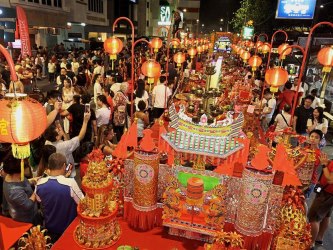Birthday of Jade Emperor

In Chinese folklore, the Jade Emperor holds the highest position, residing in a
luxurious heavenly palace high above the skies. He governs all deities in
Buddhist and Taoist religions, as well as those depicted in mythological tales.
The Jade Emperor is not only the supreme deity revered by Taoists but is also
widely worshipped by ordinary Chinese. Taoist temples across Malaysia enshrine
sculptures of the Jade Emperor, with specific temples dedicated to him known as
Jade Emperor Temples.
Taoists celebrate the Jade Emperor's birthday on the ninth day of the first
Chinese lunar month, marked by grand rituals and sacrificial ceremonies.
In Chew Jetty, Penang, at midnight, fireworks light up the sky, commemorating
the deity's birthday, also referred to as Thnee Kong Seh by locals, on the ninth
day of the new Chinese Lunar Year. Visitors are entertained by various vibrant
activities, including appearances by the God of Prosperity, lion dances on
stilts, and diverse cultural performances.
Hokkiens offer prayers to the Jade Emperor, known as Thnee Kong Seh, as an
expression of gratitude for saving their lives.
Historically, during the Ming Dynasty (1368 - 1644 AD), Hokkien people in Fujian
Province, China, faced persecution during a regional war. They sought refuge in
sugar cane plantations, following the advice of the Jade Emperor God, to evade
attacks. Eventually, their persecutors abandoned the search. On the 9th day of
the Chinese lunar new year, coinciding with the Jade Emperor God's birthday,
they emerged from the sugar cane plantations after the war.
The Hokkiens offered sugarcane to express gratitude to the Jade Emperor God for
their salvation. This day also became the Hokkien New Year, allowing them to
celebrate the Chinese New Year. Today, the Jade Emperor's Birthday is celebrated
by all, with prayers for good health, prosperity, and a promising year ahead.
undo Malaysian Festivals